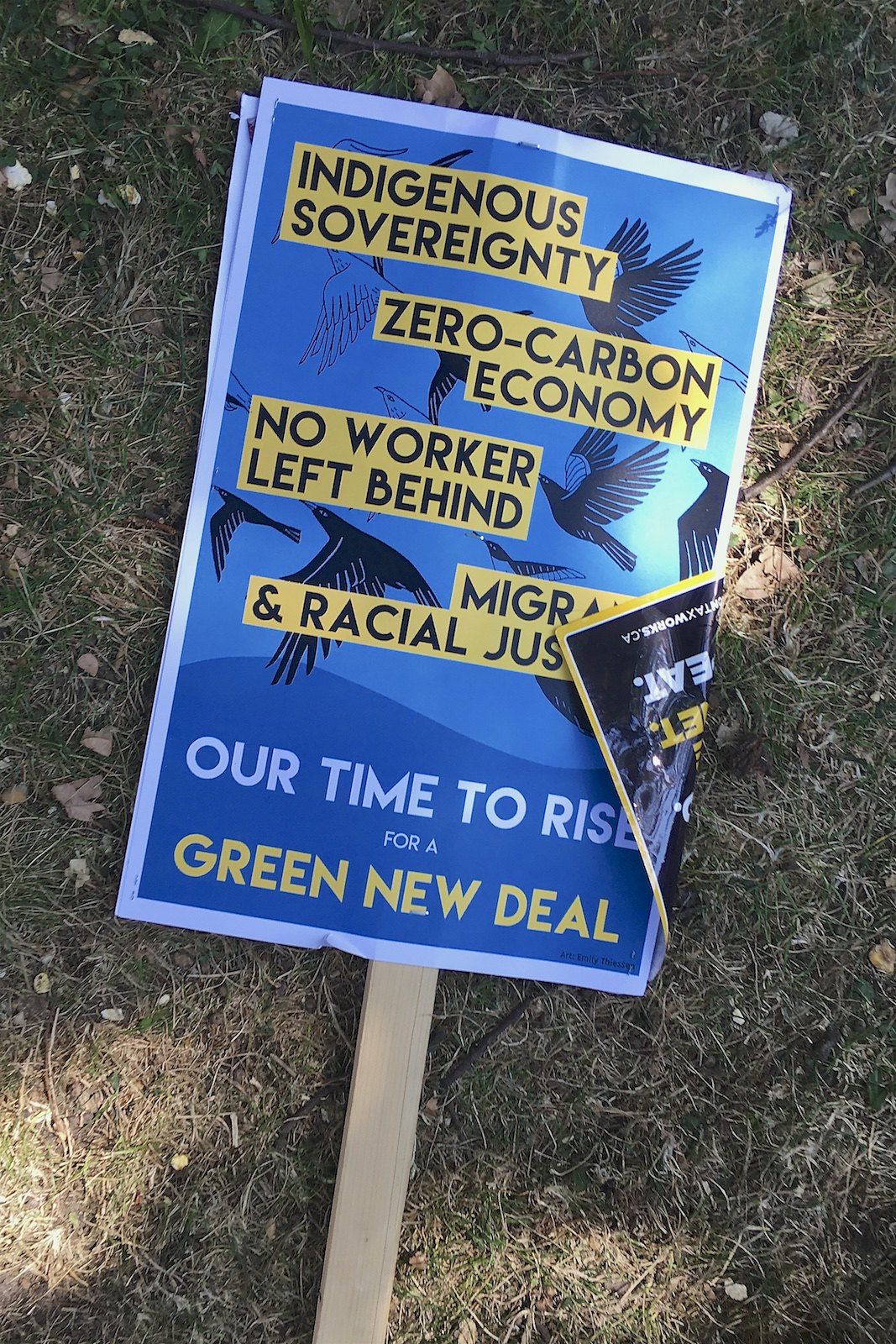Overview
Our current racial capitalist system is powered by an extractive energy model - one that sacrifices the health and wellbeing of people and ecosystems for the sake of profit and growth. Cheap nonrenewable energy and minerals, that took millions of years to form, have been fueling the economy of growth for the past 150 years and their extraction is becoming exponentially more destructive. The global demand for energy continues to grow at around 2% annually and all forms of energy use are growing together: gas, coal, oil, nuclear and renewables.
While the awareness around planetary destruction caused by fossil fuels has grown, many solutions do not adequately address the systemic causes for the energy crisis, and are simply looking for alternative - seemingly “greener” - ways to fuel capitalism. Reversing this growth and expansion of the energy sector is an urgent and essential step in building an alternative energy system. Climate and environmental justice groups have been calling for a shift from a corporate centralized energy system to one that is localized - produced, owned and governed by communities. Energy justice calls to end market-based mechanisms that impair efforts to truly end fossil fuel pollution disproportionately affecting low income and communities of color, and to stop false solutions that seek corporate industrialized “green” alternatives instead of systemic change of the energy system.
Working towards an alternative energy system comes in tandem with transforming the economy. We must step away from the fuel-dependent extractivist and growth-based system we currently live in towards a localized, community-driven, and regenerative one (read more about that on our Economy page). Without a comprehensive plan to transform how and why we use fuel and stepping away from extractivist economy, no alternative methods of energy production and distribution would provide the kind of transformation communities and the planet require. Thus, the alternatives proposed in this section are rooted in a collective and systemic overhaul of how dependent capitalist lifestyles are on a constant consumption of energy (whether it is “renewable” or fossil fuel-based).
Way Forward
Way forward 1:
Energy Democracy
As defined by Climate Justice Alliance, “Energy Democracy frames the international struggle of working people, low-income communities, Asian and Pacific Islander, Black, Brown, and Indigenous nations and their communities to take control of energy resources from the energy establishment and use those resources to empower their communities literally (by providing energy), economically, and politically. It means bringing energy resources under public or community ownership and/or governance.”
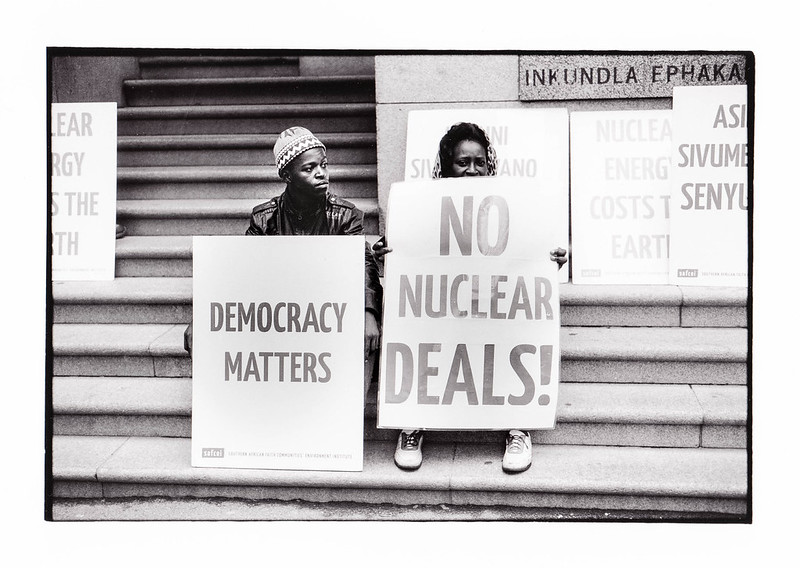
Organizations leading the way in Energy Democracy:
Climate Justice Alliance’s Energy Democracy working group (EnDEM)
The Our Power Plan: Charting a Path to Climate Justice - The plan urges federal and state decision-makers to assure that frontline environmental justice communities and workers be primary stakeholders in the implementation process of the Clean Power Plan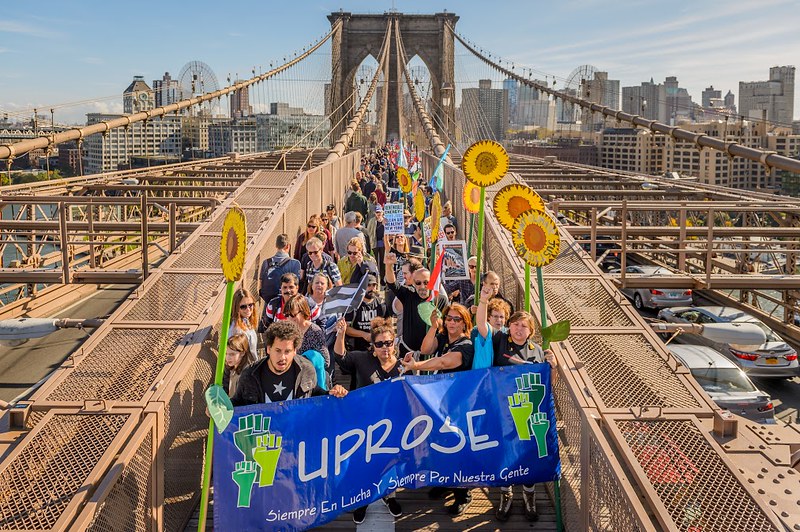 "Uprose" by 350.org is licensed under CC BY-NC-SA 2.0 - 2017
"Uprose" by 350.org is licensed under CC BY-NC-SA 2.0 - 2017
UPROSE
Uprose works in the interest of a Just Transition, a move away from the extraction economy and towards climate solutions that put frontline communities in positions of leadership.- Sunset Park Solar is New York City’s first community solar project owned and operated by a cooperative for the benefit of local residents and businesses. It is a 685 kilowatt solar project that will be built on the Brooklyn Army Terminal rooftop.
Institute for Local Self-Reliance
ILSR provides technical assistance to communities about local solutions for sustainable community development in areas such as banking, broadband, energy, and waste through local purchasing.- Community Power Interactive Toolkit
- Beyond Sharing: How Communities Can Take Ownership of Renewable Power
- Local Energy Rules [Podcast Series]
- Community Power Map
ESKOM Research Reference Group: Achieving a Just Transition for South Africa.
- Alternative Information and Development Centre (AIDC), Trade Unions for Energy Democracy (TUED), and South Africa's National Union of Metalworkers (NUMSA), Transnational Institute (TNI) and National Union of Mineworkers (NUM) are developing a road map to establish a new public electricity system based on a progressive energy transition and restructuring of Eskom, the South Africa’s state-owned power company.
- What Is Energy Democracy? Rosa Luxemburg Stiftung
Instituto de Ecología Política (IEP) / Institute of Political Ecology (IPE) - Chile
IEP’s work has been carried out through education for sustainability, research, strengthening civil society, education and reporting campaigns, and legal actions in the defense of the environment and people; through the creation of strategic alliances and the development of public policies the right to live in a healthy environment can be guaranteed.- Camino Solar: An initiative by IEP to promote citizen participation in the generation of photovoltaic energy, in order to contribute to the decentralization and democratization of the transition towards an energy model based on renewable energies. [Video]
Centre for Environment and Energy Development - India
CEED is a solution-driven organization that works towards creating inspiring solutions to maintain a healthy, clean and sustainable environment- 100% Renewable Energy (RE) Bihar - A Guide Map
- CEED decentralized renewable energy [Video]
More Resources on Energy Democracy
Books, Articles, and Reports
- Energy Democracy: Advancing Equity in Clean Energy Solutions, edited by Denise Fairchild, Al Weinrub
- “Energy Democracy: Community-Led Solutions – Three Case Studies” by Center for Social Inclusion
- Tracing the emerging energy transitions in the Global North and the Global South - Authors: Ortzi Akizu, Leire Urkidi, Gorka Bueno, Rosa Lago, Iñaki Barcena, Martin Mantxo, Izaro Basurko, Jose Manuel Lopez-Guede
- Democratizing Energy to Counter the Climate Catastrophe, Resilience.org
- Potencial Cooperativas ERNC en América Latina - Instituto de Ecología Política (IEP) [Paper, ES]
- Principals of Energy Democracy
- Seminario propone potenciar cooperativas de energía en Latinoamérica - Instituto de Ecología Política (IEP) [Article, ES]
- Towards Energy Democracy, TNI
- The Future is Public: Democratic Ownership of Public Services, TNI
- A renewable energy model based on participation, collective ownership and gender equity, TNI
- Hundreds of Thousands Are Without Power Thanks to PG&E. This Shows Why We Need Public Ownership, In These Times
- Energy Democracy: Redistributing Power to the People Through Renewable Transformation
- The Energy Democracy Flipbook, curated by Emerald Cities Collaborative
- Utility Justice Campaign (California-based campaign for a safe, reliable, community-and-worker-owned energy system)
- The PG&E Bailout and What It Means for You, Utility Justice Campaign (California)
- Leap Manifesto: A Call for Canada Based on Caring for the Earth and One Another
- Towards Energy Democracy, TNI
- Wildfires, Shutoffs, And A Just Transition, Movement Generation
- Life After Mining, Yes to Life, No to Mining
Way forward 2:
Renewable Energy
While renewable energy has been rapidly growing in popularity as the only viable alternative source of energy for a sustainable future, conversations around renewable energy tend to leave an impression that it can fully substitute our current reliance on fossil fuels. But that is neither possible (due to physical and technical obstacles of renewable energy production) nor sustainable (as producing renewable energy still requires non-renewable resources, such as minerals). A just and equitable energy transition for the people and the planet, requires us to think beyond the realm of industrial capitalism, as no “planet-friendly” energy system can sustain the current need for exponential growth. The implementation of and advocacy for renewable energy by organizations presented in this section goes in tandem with the principles of Energy Democracy highlighted in the first Solution.
Organizations & campaigns leading the way in Renewable Energy:
Sacred Earth Solar
Sacred Earth Solar empowers front line Indigenous communities in Canada with renewable energy.- Piitapan Solar Project - a 20.8kW renewable energy installation in Little Buffalo that powers the community health centre launched by Sacred Earth Solar in 2015. The 80-panel solar project has created more green jobs and reduced the community’s reliance on fossil fuels.
- Sacred Earth Solar - Protecting Land is Protecting Women Video
Post Carbon Institute
Post Carbon Institute’s work in relation to Energy focuses on growing a collective understanding of our energy reality, and the need for both conservation and appropriate, community-centric renewable energy.Green New Deal
The Green New Deal is a congressional resolution that lays out a grand plan for tackling climate change, calling for state- based solutions. While throughout each sector presented by Climate Resource Hub, we highly encourage to step away from state-based solution, due to complexity of the global energy network, some level of state intervention is required to not only leave fossil fuels in the ground and halt any further expansion, but also to lift up highly resource intensive alternative energy projects.- The GND as submitted to US House of Representatives
- Climate Justice Alliance & The Green New Deal: A Green New Deal Must Be Rooted in a Just Transition for Workers and Communities most impacted by Climate Change
- Indigenous Environmental Network responded to the Green New Deal framework by highlighting that any GND Must be rooted in the Indigenous Principles of Just Transition
- IEN’s response to the GND resolution that voices concerns around how it leaves incentives by industries and governments to continue causing harm to Indigenous communities
8th Fire Solar
8th Fire Solar is building a better future for our Native American communities by creating and assembling a sustainable and renewable energy product: solar thermal panels.Solar Bear
Solar Bear is the only Native American owned full service solar installation company in the state of Minnesota that builds renewable energy projects for the future generations of Turtle Island and Mother Earth.Kara Solar
Kara Solar is a solar-powered river transportation, energy, and community enterprise initiative in the Ecuadorian Amazon. This sort of initiative is important as it strengthens indigenous sovereignty and land rights, thereby funding these types of projects enhances the resiliency of the Amazonia rainforest and lowers dependency on fossil fuels in that region.- Conceived in a dream, new solar canoe will serve Amazon tribe
- Here comes the sun canoe, as Amazonians take on Big Oil
More Renewable Energy Resources:
Books, Articles, and Reports
- Resilience.org, Energy Section
- Power for the People: Delivering on the Promise of Decentralized, Community-Controlled Renewable Energy Access, WEDO
- Ordinary Citizens Help Drive Spread of Solar Power in Chile - Inter Press Service
- Another Energy Is Possible, Heinrich Boll Foundation
- Our Power: Achieving a Just Energy Transition for South Africa, AIDC, TNI, TUED
- Community Choice Energy, Local Clean Energy Alliance
Who’s In The Way
Who’s In The Way
Obstacle 1:
Fossil fuel Industry
The Fossil fuel industry is the bedrock of capitalism. Big Oil companies have known about the destruction that burning fossil fuels wrecks on the planet for decades, but hid the truth for as long as possible. Now, that the planetary devastation caused by fossil fuels has become common knowledge, the energy sector continues to act despite that truth because they can. Transitioning away from fossil fuels requires a fundamental change in society, so the global political forces that are comfortable within the capitalist status quo are letting the fossil fuel industry continue the planetary destruction, while quickly and effectively enriching themselves and those who allow the extraction to continue. Analysis by Oil Change International demonstrated that G20 countries spend $444 billion per year in subsidies to oil, gas, and coal production - government backing of the fossil fuel sector around the world is one the main reason the industry survives to this day. Keeping fossil fuels in the ground, particularly given how increasingly destructive the methods of extraction have become as we continue to exhaust the resources, is a fundamental step of energy justice work.
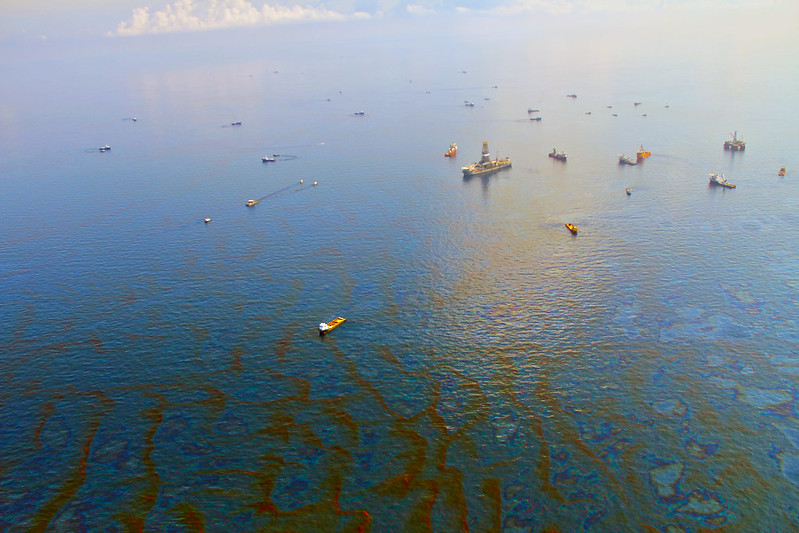 "Deepwater Horizon Oil Spill Site" by Green Fire Productions is licensed under CC BY 2.0
"Deepwater Horizon Oil Spill Site" by Green Fire Productions is licensed under CC BY 2.0
Who’s Working on Dismantling the Fossil Fuel Industry:
Oilwatch
Oilwatch is a network of resistance to the impacts of fossil fuels (oil, gas and coal) industries on people’s and their environments.- Oilwatch Worldwide, News & Campaigns
- Oilwatch Africa 2019 Declaration: Stop the Extractivist Addiction
- Keep Oil Underground: A report by Oilwatch with case studies from the Global South
- Links to organizations organizing against fossil fuel destruction around the world
Oil Change International
OCI works to expose the true costs of fossil fuels and facilitate the ongoing transition to clean energy.- Stop Funding Fossil Fuels Program uses critical analysis and strategic organizing to end the vast quantities of government support flowing to the fossil fuel industry and accelerate the clean energy transition.
- Still Digging: G20 Governments Continue to Finance the Climate Crisis: The report finds that since the Paris Agreement, G20 countries have acted directly counter to it by providing at least USD 77 billion a year in finance for oil, gas, and coal projects through their public finance institutions.
Treaty Alliance to Stop Tar Sands Expansion
This Treaty is an expression of Indigenous Law prohibiting the piplines/trains/tankers that will fuel the expansion of the Alberta Tar Sands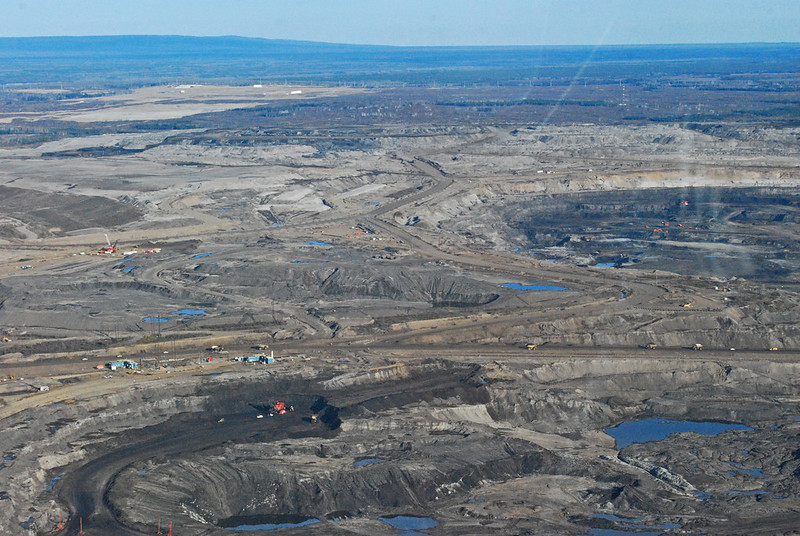




Stop the Money Pipeline
Stop the Money Pipeline is a campaign targeting the financial sector’s support of the cliamte crisis- Rainforest Action Network Campaign: JPMorgan Chase Defund Climate Change
- Liberty Mutual: Ditch Fossil Fuels!
- BlackRock’s Big Problem: Campaign targeting asset managers to stop driving climate change
- DivestED : National training and strategy hub for student fossil fuel divestment campaigns.
- Sign the pledge to divest in the next year - put your money where your solidarity is (organized by Mazaska Talks)
More resources on dismantling the fossil fuel industry:
Reports:
- Towards a Post-Oil Civilization: Yasunization and other initiatives to leave fossil fuels in the soil, EJOLT
- Banking on Climate Change 2020: Fossil Fuel Finance Report Card, RAN
- Drilling Towards Disaster: Why U.S. Oil and Gas Expansion Is Incompatible with Climate Limits, Oil Change International (OCI)
- Burning the Gas ‘Bridge Fuel’ Myth: Why Gas Is Not Clean, Cheap, or Necessary, OCI
- Building a Post Petroleum Nigeria (Leave new oil in the soil), a Proposal by Friends of the Earth Nigeria & Environmental Rights Action
- Oil, Gas and Climate: An Analysis of Oil and Gas Industry Plans for Expansion and Compatibility with Global Emission Limits, CIEL
Campaign:
- Pledge to Divest, Mazaska Talks
Obstacle 2
Mineral Extractivism
 "The Mine... Another Look" by Storm Crypt is licensed under CC BY-NC-ND 2.0
"The Mine... Another Look" by Storm Crypt is licensed under CC BY-NC-ND 2.0
Mining for minerals has a similar record to fossil fuel extraction in terms of the egregious human rights violations and environmental devastation. Minerals are used in everything from our smartphones and jewelry to electrical wiring and fertilizers - and, similarly to oil, the more we deprive this nonrenewable resource, the more destructive the methods of extraction become.
It is crucial to draw attention to mineral extractivism when discussing a Just Energy Transition. An important element to consider in fighting for a transition towards renewable energy are the non-renewable inputs required to produce that energy. Minerals, particularly rare earth elements, are essential to the production of renewable energy, from solar panels to wind turbines and batteries. Many of the key minerals critical to renewable energy production are already scarce and have a history of violence and even slave labor associated with their production. Besides, as analysis by EarthWorks shows “The skyrocketing demand for these minerals is driving the expansion of mining in geographic “hotspots” throughout the world – and even to the depths of the ocean – with disproportionately negative impacts in the Global South.”
The necessity of nonrenewable resources - commonly devastating to both communities and the planet, especially when produced at a large industrial scale - in renewable energy against points to the dire need to actually decrease and localize energy and mineral demand.
Below are examples of communities successfully transitioning out of extractivist mining economy, as well as organizations advocating for people and places affected by skyrocketing mineral demands.
Yes to Life, No To Mining (YLNM)
YLNM is a global solidarity network of and for communities, organisations and networks who are standing up for their Right to Say No to mining and advancing life-sustaining, post-extractive alternatives. In collaboration with the Gaia Foundation, YNLM launched a series of Emblematic Case studies from communities around the world that have been successfully resisting destructive mining.- Myanmar Case Study: A collective from the Karen Environment and Social Action Network (KESAN) describe the Indigenous Karen People’s connection to their ancestral territory, and how they created the Salween Peace Park to assert their right to self-determination and protect their lands from militarism, mining and mega-dams.
- Cajamarca, Colombia Case Study: A study of how farmers, youth and other environmental defenders from Cajamarca, Colombia, have stopped a vast gold mine, re-valued the ‘true treasures’ in their territory and begun to develop regenerative alternatives to mining ‘development’.
- Galiza Case Study (Regenerating the Commons): Joám Evans Pim, villager in the Frojám Community Conserved Area and activist in Galician anti-mining network ContraMINAcción, explains how small communities like Frojám are confronting destructive mining by regenerating community governance and traditional territories.
Environmental Justice Organisations, Liabilities and Trade (EJOLT)
EJOLT looks at mining conflicts and waste disposal conflicts to study the links between increased metabolism of the economy and environmental damage.EJOLT notes following organizations working against mineral extractivism:
Mines and Communities (MAC)
The MAC website seeks to exposes the social, economic, and environmental impacts of mining, particularly as they affect Indigenous and land-based peoples.Mines, Minerals and People
MM&P is a growing alliance of individuals, institutions and communities who are concerned and affected by mining. The isolated struggles of different groups have led us to form into broad a national alliance for combating the destructive nature of mining.Mining Justice Alliance
MJA is a coalition of activists, civil society organizations, students, and community members who initially formed to mobilize around Gorldcorp’s 2011 Annual General Meeting. Our focus has expanded in response to widespread concerns about endemic injustice within Canada’s state-supported mining industry.MiningWatch Canda:
MiningWatch Canada works in solidarity with Indigenous peoples and non-Indigenous communities who are dealing with potential or actual industrial mining operations that affect their lives and territories, or with the legacy of closed mines, as well as with mineworkers and former workers seeking safe working conditions and fair treatment.Observatorio de Conflictos Mineros en América Latina (OCMAL) [ES]
OCMAL’s main objective is the defense of the communities and peoples that are impacted by the effects of mining in the region.More Reading Materials:
- Performing ‘blue degrowth’: critiquing seabed mining in Papua New Guinea through creative practice by John Childs
- Extracted: How the Quest for Mineral Wealth Is Plundering the Planet by Ugo Bardi
- The Geopolitics of Mineral Resources for Renewable Energy Technologies by Marjolein de Ridder
- Responsible Mineral Sourcing for Renewable Energy by EarthWorks
- Report: Going 100% renewable power means a lot of dirty mining, Grist
- FACT SHEET: Battery Minerals for the Clean Energy Transition, EarthWorks
False Solutions
False Solution 1:
False “Renewables”
What gets listed under the “renewable energy” umbrella can vary greatly depending on the politics of who’s presenting. For instance, the majority of the “green” corporate sector highlights that energy transition is not possible without the use of nuclear energy, biofuels, and mega-dams. While that point is not entirely untrue, the necessity of these alternatives are entirely based on the desire to hold on to the extractive neoliberal capitalist system that brought us to this crisis in the first place. What proponents of such large scale industrial energy alternatives focus on is their “carbon neutral” footprint while failing to mention just how dangerous and destructive mega dams, nuclear energy, biofuels and incinerators are to planetary and community health. Such high-cost large scale projects also go in opposition to the principles of Energy Democracy and are not meant to benefit communities directly but rather serve as a substitute for profits currently made in the fossil fuel industry,
Below is a short list of false “renewables” and cooresponding organizations working to resist their negative impacts on their communities:
Nuclear Energy
As pointed out by Friends of the Earth International, “Nuclear power is a highly dangerous, high-cost energy source which poses the threat of nuclear proliferation and a severe risk to human life and the environment. Its potential as a major source of destruction has been clearly and repeatedly demonstrated.”Friends of the Earth International:
FoE’s nuclear campaign works to reduce risks for people and the environment by supporting efforts to close existing nuclear reactors and fighting proposals to design and build new ones.
Mega-dams
Large-scale hydroelectric dam projects (aka mega-dams) drive extinction of species, massive displacements of entire villages, flood forests and wetlands, and are thus not a viable strategy for a Just energy Transition. (Read more about the injustices perpetrated by mega-dam projects on our Water page)International Rivers is part of the global struggle to protect rivers and the rights of communities that depend on them.
- 10 Things you Should Know About Dams
- Problems with Big Dams [Video]
- Learn more about Dams & water justice issues on our Water sector page
 "Three Gorges dam" by hughrocks is licensed under CC BY-SA 2.0
"Three Gorges dam" by hughrocks is licensed under CC BY-SA 2.0
Biofuels
Growing biomass requires vast amounts of precious farm and forest land in order to produce a tiny fraction of energy (read more on why monocrops and the industrial agriculture system are deeply damaging to the soil and entire ecosystems on our Food page).Biofuel Watch provides information, advocacy and campaigning in relation to the climate, environmental, human rights and public health impacts of large-scale industrial bioenergy.
Incineration
There is nothing “renewable” about burning waste that took many precious resources to produce in the first place. Moreover, incineration is incredibly dangerous as it releases high quantities of toxic air and water pollutants and threatens public health of communities living in proximity to incinerators, which are disproportionately low income and communities of color.Global Alliance for Incinerator Alternatives: GAIA aims to catalyze a global shift towards environmental justice by strengthening grassroots social movements that advance solutions to waste and pollution. GAIA envisions a just, zero waste world built on respect for ecological limits and community rights, where people are free from the burden of toxic pollution, and resources are sustainably conserved, not burned or dumped.
More reading resources:
- U.S. Municipal Solid Waste Incinerators: An Industry in Decline, TEDC
- “Waste-to-Energy” has no place in Africa, GAIA
- Facts about “Waste-to-Energy” Incinerators, GAIA
False Solution 2:
Carbon Pricing
Carbon Pricing privatizes the air we breathe, turning our atmosphere into something that can be traded on the private market, allowing polluters to continue polluting and poisoning fenceline environmental justice communities.
Who’s Working on Dismantling/Resisting Carbon Pricing:
Indigenous Environmental Network (IEN)
IEN is an alliance of Indigenous peoples whose mission it is to protect the sacredness of Earth Mother from contamination and exploitation by strengthening, maintaining and respecting Indigenous teachings and natural laws. 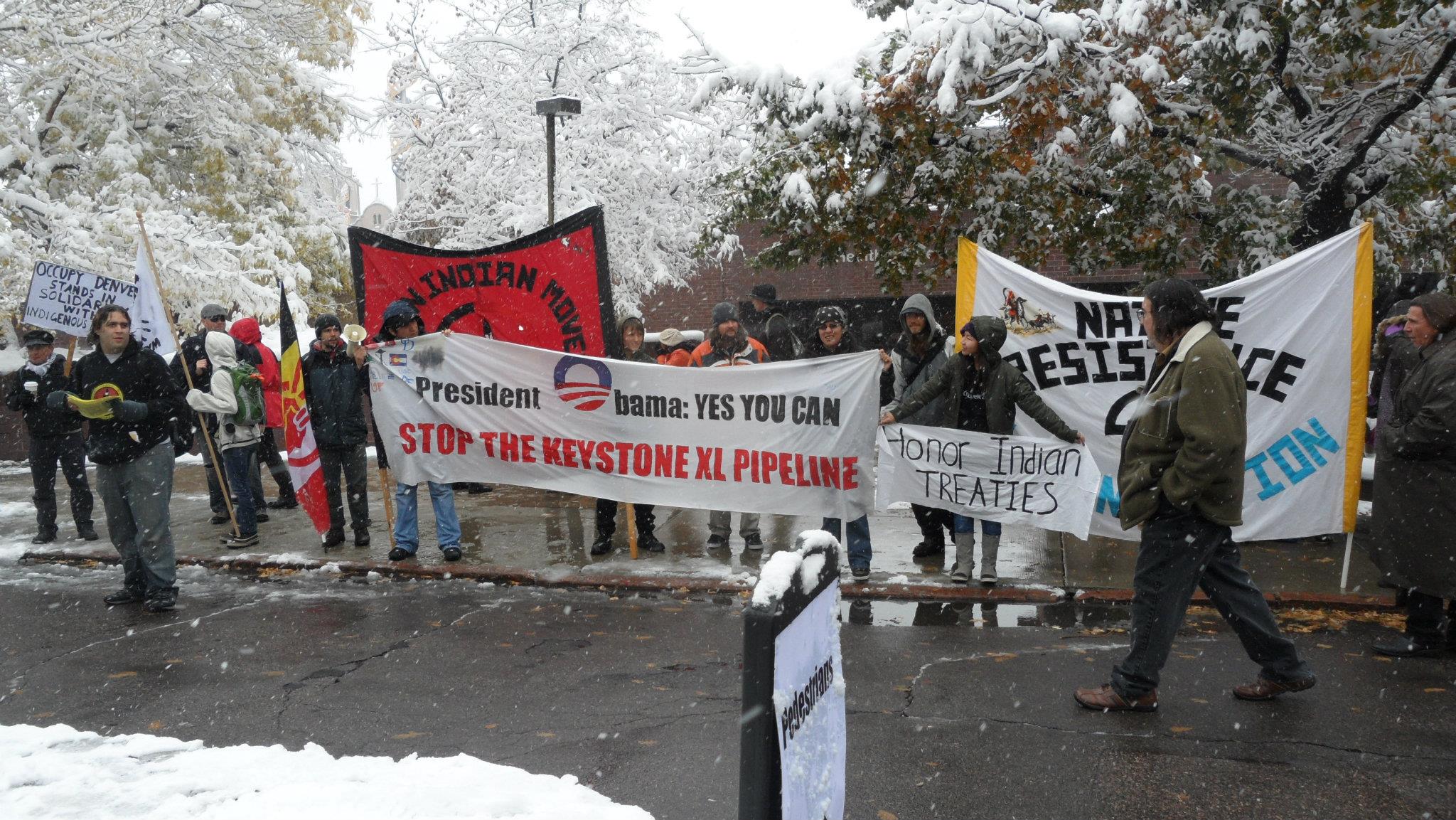 "Indigenous Environmental Network leaders interrupt President Obama - Oct. 27, 2011" by350.org is licensed under CC BY-NC-SA 2.0
"Indigenous Environmental Network leaders interrupt President Obama - Oct. 27, 2011" by350.org is licensed under CC BY-NC-SA 2.0Climate Justice Alliance (CJA)
CJA is an alliance of over 70 community organizations, movement networks, and support organizations on the frontlines of the climate crisis in North America.- Carbon Pricing Toolkit (collaboration between IEN & CJA)- part of a wider education initiative that aims to build popular education and resistance to carbon pricing from the ground up.
- Carbon Pricing: A Popular Education Toolkit for Community Resistance (by Climate Justice Alliance)
More resources on Carbon Pricing:
Books, Articles, and Papers:
- Carbon Capitalism: Energy, Social Reproduction and World Order by Tim di Muzio
- Energy transitions and the global land rush: Ultimate drivers and persistent consequences, by Arnim Scheidel & Alevgul H. Sorman
- Failing States, Collapsing Systems: BioPhysical Triggers of Political Violence by Nafeez Ahmed
- Indigenous ExtrACTIVISM in Boreal Canada: Colonial legacies, contemporary struggles and sovereign futures by AJ Willow
- Think fossil fuels are bad? Nuclear energy is even worse, MarketWatch
- The Capitalocene Part I: On the Nature & Origins of Our Ecological Crisis by Jason W. Moore
Campaigns & Statements:
- Nuclear Energy Cannot be Considered Renewable Energy, Indigenous Environmental Network
Videos:
